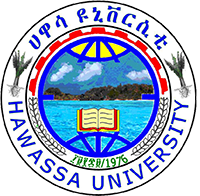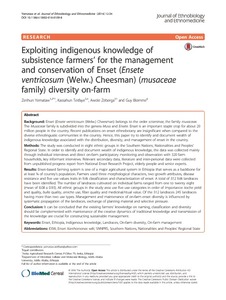Location
Hawassa university is a public university in Ethiopia.
Hawassa University (or HU) was established at Hawassa in April 2000. Since 1976 the colleges of HU had been operational starting with the College of Agriculture. The university was formed by merging three colleges in southern Ethiopia: Awassa College of Agriculture, Wondogenet College of Forestry and Dilla College of Teacher Education and Health Sciences.
Source: Wikipedia (consulted d.d. October 12th 2017)
Members:
Resources
Displaying 1 - 5 of 24Determinants of diarrhoeal morbidity: The case of children under five years of age among agricultural and agro-pastoralist community of southern Ethiopia
Background: Diarrhoea is a leading cause of morbidity and mortality among the under-five children in low-income countries. Despite improvements in water and sanitation coverage, studies show that diarrhoea is still a major public health problem in Ethiopia. This study was designed to determine the magnitude and risk factors of diarrhoea in the agricultural and agro-pastoralist communities of the rural Sidama zone, Southern Ethiopia. Methods: a cross-sectional study was conducted in July 2013. Interview and questionnaire were the main data gathering instruments used in the study.
Important knowledge gaps among pastoralists on causes and treatment of udder health problems in livestock in southern Ethiopia: results of qualitative investigation
Background
Assessment of rain water harvesting potential for supplementary irrigation in Lume district, East Shoa
Exploiting indigenous knowledge of subsistence farmers’ for the management and conservation of Enset (Ensete ventricosum (Welw.) Cheesman) (musaceae family) diversity on-farm
Enset (Ensete ventricosum (Welw.) Cheesman) belongs to the order sctaminae, the family musaceae. The Musaceae family is subdivided into the genera Musa and Ensete. Enset is an important staple crop for about 20 million people in the country. Recent publications on enset ethnobotany are insignificant when compared to the diverse ethnolingustic communities in the country. Hence, this paper try to identify and document wealth of indigenous knowledge associated with the distribution, diversity, and management of enset in the country.
The role of irrigated fodder production to supplement the diet of fattening sheep by smallholders in southern Ethiopia
Feed shortage and poor quality of available feeds are major constraints for livestock production in the highlands of Ethiopia. A trial was conducted to assess if producing irrigated oat-vetch fodder during the dry period could adequately supplement the diet of fattening sheep and generate additional income for smallholders. A total of 14 farmers and 70 sheep (5 per farmer) were involved in the trial. The farmers supplemented their fattening sheep with 200 g of irrigated oat-vetch fodder per day for about 70 days.



